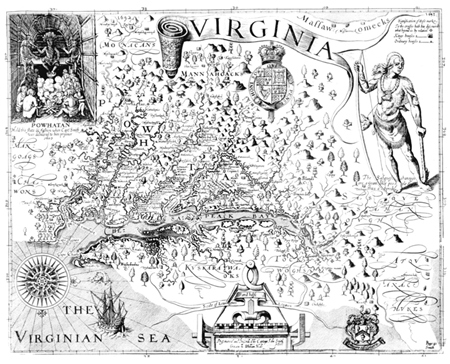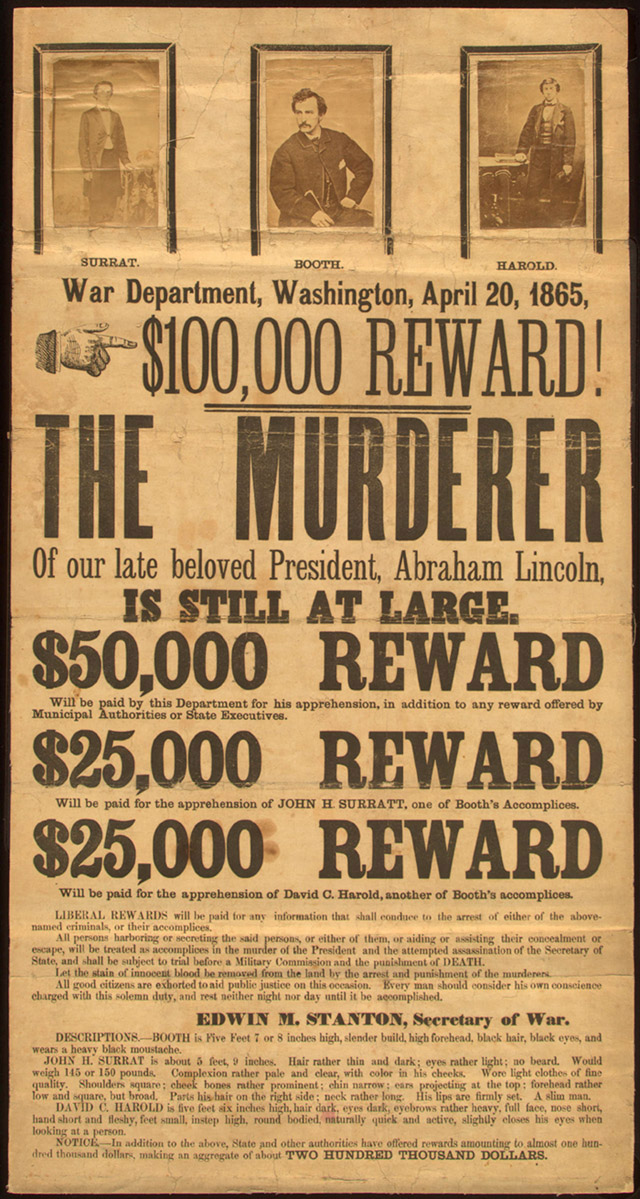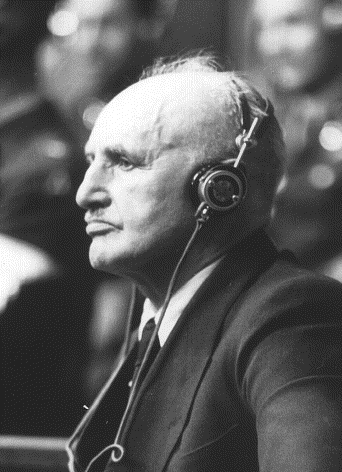
April 26 That night was the box opened, and the orders read, in which Bartholomew Gosnol, John Smith, Edward Wingfield, Christopher Newport, John Ratliff, John Martin, and George Kendall, were named to be the council, and to choose a president among them for a year, who with the council should govern. Matters of moment were to be examined by a jury, but determined by the major part of the council, in which the president had two voices. Until the 13 of May they sought a place to plant in; then the council was sworn..."

1514 Copernicus makes his first observation of Saturn.
1564 William Shakespeare is baptized in Stratford on Avon.

1607 Jamestown: An expedition of English colonists, including Captain John Smith, goes ashore at Cape Henry, Virginia, to establish the first permanent English settlement in the Western Hemisphere. Captain Smith's own account: "...three ships were provided, one of 100 tons, another of 40 and a pinnace of 20. The transportation of the company was committed to Captain Christopher Newport, a mariner well practiced for the western parts of America. But their orders for government were put in a box, not to be opened, nor the governors known until they arrived in Virginia...The first land they made they called Cape Henry; where thirty of them recreating themselves on shore, were assaulted by five savages, who hurt two of the English very dangerously.

1807 Russia and Prussia sign the Convention at Bartenstein, forming an alliance to drive France out of German states.

1812 Birth: Alfred Krupp, German arms merchant. "The Krupp family is a prominent 400-year-old German family from Essen, famous for their steel production and manufacture of ammunition and armaments. The family business, known as Friedrich Krupp AG in modern times, merged with Thyssen in 1999 to create ThyssenKrupp AG, a large industrial conglomerate. The metal business was started by Friedrich Krupp (1787–1826), who built a small steel foundry in Essen in 1811. His son, Alfred (1812–1887), known as "the Cannon King" or "Alfred the Great," invested heavily in new became a significant manufacturer of railway material and locomotives. He also invested in subsidized hotechnologies (notably the Bessemer process), acquired many mines in Germany and France, and using for his workers and started a program of health and retirement benefits. The company began to make steel cannons in the 1840s for the Russian, Turkish, and Prussian armies especially. Low non-military demand and government subsidy meant that the company specialized more and more in weapons, by the late 1880s the manufacture of armaments represented varied around 50% of the total output. When Alfred started the firm, it had five employees. At his death there were twenty thousand - the world's largest industrial company..."
1828 Russia declares war on Turkey to support Greece's battle for independence.

1865 John Wilkes Booth, the assassin of President Lincoln, is surrounded and killed by federal troops near Bowling Green, Virginia. Note: John H. Surratt, an admitted Confederate agent, claims that Booth had deposited funds in a Montreal bank regularly used by operatives of the Confederate Secret Service. Surratt confesses to plotting with Booth to abduct Lincoln and take him to Richmond in attempt to end the war and using the Montreal bank for Benjamin's spies.
1894 Birth: Rudolf Hess, Deputy Leader of the Nazi Party and after Goering the third most powerful man in Nazi Germany. Hess, the son of a wealthy German businessman, is born in Alexandria, Egypt. During WW1, he will be a second lieutenant, shock troop leader, aviator, and for a time will serve in the same Bavarian regiment as Hitler, though the two will not then meet. Hess will join the NSDAP in 1921 and become Hitler's private secretary in 1924; promoted to deputy to the Führer in 1932 and appointed Reich minister without portfolio in 1933. Hess will fly to England on an ill-fated peace mission on May 10, 1941, probably without Hitler's knowledge, and will be declared mentally ill by his Führer. Hess will be sentenced to life imprisonment at Nuremberg in 1946 and will be the last remaining prisoner in Spandau prison until his death under mysterious circumstances at the age of 93.
1900 Birth: Charles Richter, in Hamilton, Ohio, seismologist; will devise the earthquake-measuring scale that bears his name.
1915 WW1: Italy secretly signs the Pact of London with Britain, France and Russia which will put them on the side of the allies.

1919 Weimar: As Free Corps troops surround Munich, the Communists break into the Thule Society offices and arrest its secretary, Countess Heila von Westarp. Later that day, Thule members Walter Nauhaus, Prince Gustav von Thurn und Taxis, Baron Teuchert, Walter Deicke, Friedrich Wilhelm von Seydlitz, and Anton Daumelang are also captured. Rudolf Hess narrowly escapes capture by turning up late for a meeting, and watches helplessly as his friends are taken away. (Missing Years)

1933 Church and Reich: Hitler tells Bishop Berning and Monsignor Steinmann, representatives of the Catholic Church in Germany, that he is only going to do to the Jews what the Church of Rome has been trying to do without success for over 1,500 years. Note: Hitler states that he is personally convinced of the great power and significance of Christianity and will not permit the founding of another religion. For this reason, he declares, he has parted company with General Ludendorff, and stresses that Rosenberg's anticlerical book is no concern of his -- since it is a private publication. Being a Catholic himself, Hitler adds, he will not tolerate another Kulturkampf and the rights of the Church will be left intact. (Lewy)
1933 Holocaust: The Gestapo begins functioning as a state sanctioned terror organization. (Edelheit)

1935 Resistance: Dietrich Bonhoeffer establishes an underground seminary for the anti-Nazi Confessing Church at Zingst by the Baltic Sea, which in June will move to Finkenwalde in Pomerania.

1937 Spanish Civil War: The German military tests its powerful new air force, the Luftwaffe, on the Basque town of Guernica in northern Spain. Although the independence-minded Basque region opposes General Francisco Franco's Nationalist forces during the war, Guernica itself is a rural small city of only 5,000 inhabitants that had declared non-belligerence in the conflict. With Franco's approval, his Nazi allies begin their unprovoked attack at 4:30pm, the busiest hour of the market day in Guernica. For three hours, the German planes pour down a continuous and unopposed rain of bombs and gunfire on the town and surrounding countryside. One-third of Guernica's 5,000 inhabitants are killed or wounded and fires engulf the city and burn for three days. The indiscriminate killing of Guernica's women and children by the Luftwaffe will arouse world opinion, and become a symbol of fascist brutality. Note: By 1942, all major participants in WW2 will have adopted the frightful bombing innovations developed by the Nazis at Guernica, and by the war's end in 1945, millions of innocent civilians will have died during Allied and Axis air attacks on enemy cities and towns.
1938 Holocaust: The German government requires registration of all Jews with assets exceeding 5,000 Reichsmarks, whether in Germany or abroad. Only British and American Jews living in Germany are exempted.

1942 WW2: Hitler demands and receives the powers of Supreme Law Lord of Germany. His speech at the Reichstag: "I, for my part, acknowledge another precept which says that man must deal the final blow to those whose downfall is destined by God. So, what must happen, will happen. If, however, in the life of a people, judgment and reason seem to have been silenced, that does not necessarily mean that there is no thinking organ present where from outward appearances the only causes are stupidity or stubbornness..."
1942 At least 1,540 people die in the world's worst mining disaster at a colliery in Benxi, in Japanese-occupied China.
1943 WW2: The USSR breaks off relations with the exiled Poles following their demand for a Red Cross investigation of Katyn. Stalin prepares a pro-Soviet group of Poles in anticipation of taking over Poland.

1944 Diary of Leon Gladun: "Off for the front at Cassino. We were here for over a month. The most active sector of the front where so far we fired off the greatest amount of ammunition."
1945 Holocaust: American troops reach the concentration camp at Dachau. Among many others the camp still holds 326 German Catholic priests. A still larger number had passed through the camp, had died in it of starvation and disease, or had been murdered. Soon after Pope Pius XII invokes these and many other acts of persecution to show that the Catholic Church in Germany had strongly resisted the Nazi regime. (Lewy) Note: Most other sources, such as Martin Gilbert, state that the Americans won't liberate Dachau until April 29. (See April 29)
1945 WW2: The Germans evacuate the last survivors from Stutthof by sea to Lübeck. Hundreds die during the voyage. (Atlas)
1945 Those Vichy French: Marshal Henri Philippe Petain, the head of France's Vichy government during WW2, is arrested on treason charges.

1946 Nuremberg War Crimes Trials: Julius Streicher testifies. "...I was called a bloodhound-a blood czar of Franconia; my honor was attacked, a criminal was paid 300 marks to swear in this very hall that he had seen me, as an officer in France during the war, rape a Madame Duquesne, a teacher's wife in Atis, near Peronne. It was 2 years before someone betrayed him and the truth came out. Gentlemen, the receipt for 300 marks was produced here in this court. With 300 marks they tried to deprive me of my honor. I mention this case only because my case is a special case; and if it is to be judged with justice, then I must be allowed to make such a remark in passing. In this connection, I may say that it is no coincidence that the first question asked me by the Soviet Russian officer who interrogated me was whether I was a sex criminal...And so, Gentlemen, in the year 1921-I return now to that period-I went to Munich. I was curious because someone had said to me, "You must hear Adolf Hitler some time." And now destiny again takes a hand. This tragedy can only be grasped by those whose vision is not limited to the material, but who can perceive those higher vibrations which even today have not had their full outcome. I went to the Munich Buergerbraeukeller. Adolf Hitler was speaking there. I had only heard his name. I had never seen the man before. And there I sat, an unknown among unknowns. I saw this man shortly before midnight, after he had spoken for 3 hours, drenched in perspiration, radiant. My neighbor said he thought he saw a halo around his head; and I, Gentlemen, experienced something which transcended the commonplace. When he finished his speech, an inner voice bade me get up. I went to the platform. When Adolf Hitler came down, I approached him and told him my name. The Prosecution has submitted a document to the Tribunal which recalls that moment. Adolf Hitler wrote in his book, Mein Kampf, that it must have cost me a great effort to hand over to him the movement which I had created in Nuremberg. I mention this because the Prosecution thought that these things in Hitler's book, Mein Kampf, should be submitted and used against me. Yes, I am proud of it; I forced myself to hand over to Hitler the movement which I had created in Franconia. This Franconian movement gave the movement which Adolf Hitler had created in Munich and southern Bavaria a bridge to northern Germany. That was my doing..."
1954 The largest clinical trial in medical history is launched in New York City by the National Foundation for Infant Paralysis (NFIP). The trial is for a polio vaccine created by Jonas Edward Salk, who had worked on the vaccine for several years, employing methods developed by John Enders at Harvard University. The vaccine is actually the polio virus itself, but treated to make it unable to pass on the disease, while allowing the body to build up immunity against polio. Salk, however, is apprehensive about the mass trial. A similar trial in 1935, gave healthy children polio, killing six of them. The virologist had tested the vaccine on some children, including his three sons, but is still unsure about the vaccine. "When you inoculate children with a polio vaccine, you don’t sleep well for two or three months." However, the NFIP, founded by FDR (himself paralyzed by polio), goes ahead with vaccinating 1.8 million children across 44 states, at a cost of $7.5 million. This marks the end for a disease that had affected tens of thousands of children every year.
1962 Britain's first satellite, Ariel I, is launched from Cape Canaveral by a Thor-Delta booster.

1968 The United States explodes a one-megaton nuclear device called Boxcar beneath the Nevada desert.
1980 Following the failed US attempt to rescue the US Embassy hostages in Iran, the Tehran government announces that the captives are being scattered to thwart future rescue efforts.

1986 Chernobyl: At 1:23am in Pripyat in the Ukraine, the Chernobyl atomic power station explodes. A three-hundred-square-mile area is evacuated in the attempt to protect over 100,000 residents of the area from radiation poisoning. 31 people die and unknown thousands are exposed as the radioactive material carried in the atmosphere spreads throughout the world.
1990 Israeli Prime Minister Yitzhak Shamir, leader of the right-wing Likud bloc, is chosen to form a new government after Labor Party leader Shimon Peres fails to form a coalition.
1992 Thousands of Russians celebrate Orthodox Easter as, bells ring out from the walled Kremlin for the first time since Bolshevik leaders vowed to crush Christianity for ever.
1996 China, Russia and three former Soviet Republics sign a treaty aimed at reducing tensions along their common borders.
1999 The head of the International Committee of the Red Cross, Cornelio Sommaruga, meets with three US soldiers held captive by Yugoslavia.
2001

2002

2003

2004

2005

2005

2005

Visit:




 Visit:
Visit:

Click Here to email the History: One Day At a Time webmaster.